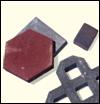Clay Brick Pavers Shapes
Brick paver shapes allow for some interesting and decorative designs that are not so practical with other types of pavement systems and products. They have a wide assortment of shapes and colors and can be laid in a variety of patterns to create a visually pleasing landscaped environment for the person undertaking the project.
 |
There are so many different clay brick paver shapes produced by the manufacturers across the United States that you would be certain to find the perfect landscaping product that you desire. They begin from the simplest of shapes, such as rectangular shapes, to more complex shapes such as wedged shapes. Larger shapes are intended for larger areas because they are faster to install and will appear to be in proportion with the larger scale of the area to be paved. |
Some creative designs can be achieved by using smaller and larger clay pavers together to form a unique setting. Also bear in mind that you can use different color combinations and different paver shapes for even more artistic endeavors.
Shape Categories
| There has been research done and observations made that indicate the effectiveness of paver shapes upon the structural integrity of the pavement system. Dented shapes set together more uniformly because their shape is conducive to full interlock which means they are less likely to be subjected to movement or destruction. With this research in mind, pavers have been classified into 3 distinct categories. |  |
- Fully interlocked on two axes.
- Interlocked on one axes.
- Non-dented or square and rectangular shapes.
Heavy trafficked areas are better suited to full interlocked pavers (type 1), such as driveways and busy pedestrian paths.
Areas that are intended for light traffic are suited to rectangular and square shaped pavers (type 2 & 3), such as walkways and footpaths.
Rectangular shaped clay brick pavers are considered to be the most practical and common of all the shapes that are available in today's large marketplace. Why? Because they are easier to manufacture, they are easy to package, easy to store and ship to supply store anywhere around the world. They have stood the test of time, having been the preferred shape since the start of the paving concept dating back thousands of years.
Special Shapes
There are other types of clay paver shapes that suit special installations, such as noise reduction, water permeability, grass growth and mechanized installations.
Some people prefer shapes that are unique looking because, in their opinion, it looks more visually appealing than standard ones.
Mold technology improvement is allowing for complex and irregular paver shapes to be manufactured. The demand for different shapes is growing steadily. Paver manufacturers are beginning to develop new products to supply this smaller market segment.
Here is a sampling of the different paver shapes.
|
 |





